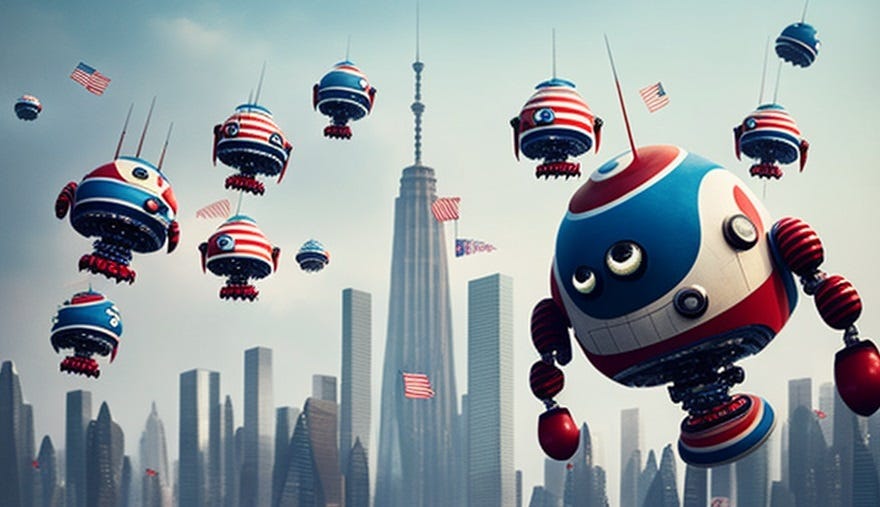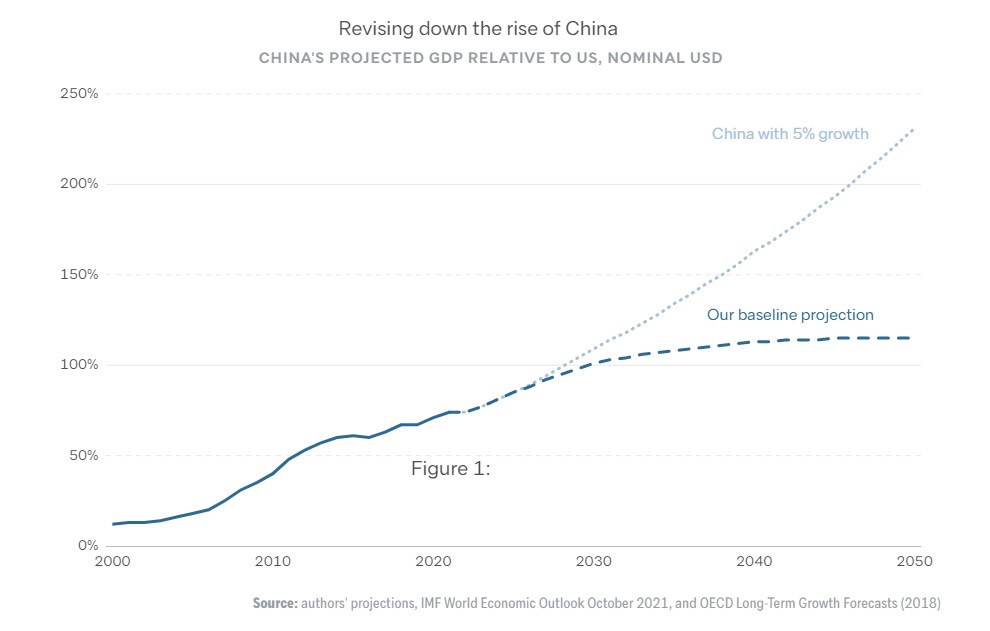🤖 ChatGPT and technological surprise: China edition
Why didn't China invent the chatbot everyone is talking about?
If you’re a Star Trek fan who peruses Quora or Reddit, you’ll occasionally see a discussion about the relative technological capabilities of three primary galactic superpowers: the Federation, Klingon Empire, and Romulan Empire. The television shows and movies generally show them at roughly the same tech level. The out-of-universe explanation is obvious: having three equally-powerful protagonists makes for good storytelling. The situation also reflects the Cold War-era roots of the series when the United States and Soviet Union were the planet’s dominant militaries capable of destroying one another.
Another way to characterize this situation: the liberal democratic Federation and the totalitarian Klingons and Romulans all seem to occupy about the same place on the technological frontier through their own independent scientific discovery and invention. Of course, things were never really so equal in the real world. The US was far wealthier than the Soviet Union and able to innovate across its economy, not just the military. And with the full onset of the Information and Communications and Technology Revolution, the inadequacies of the Soviet system became even more apparent, as was growing Soviet dependency on Western advanced technology. As science historian Loren Graham wrote back in 1984:
The Soviets certainly understand the significance of computers -- they've acknowledged it for the last 25 years. But the Soviet Union has not been able to adapt the computer to everyday life, and the country is now many years behind advanced western societies in the practical exploitation of computer power. … Several Western analysts have spoken of the "addictive dependency" of Soviet computer designers on Western operating systems and programming languages. Soviet software programs are often literal copies of Western programs, even to the point of the use of Latin letters instead of native Cyrillic. Some Soviet-manufactured computers are so faithfully copied from IBM models that they will run the same programs without modification. In several instances, the Soviets have copied even the errors, or "bugs" in the American operating systems.
Graham went on to identify a host of factors that he considered key to continued innovation and diffusion of ICT, with the US having an edge over the USSR in all of them:
* A tradition that successful technology should be privately owned and controlled if it is advantageous to do so.
* A tradition of free access to information.
* A tradition of creating large amounts of reliable and accurate data about the economy and about society.
* A financial system offering a diversity of business and consumer services.
* Widespread education in business and technological skills, including typing and programming.
* Excellent telephone lines that can by used for remote access to data bases.
* Close relationships between sellers and buyers of technology which include consulting services, maintenance, and spare parts when needed.
* A tradition of entrepreneurship and innovation under which a person who develops a successful product — whether hardware or software — can legally make an attempt to sell it.
In other words, America’s socioeconomic system was liberal democratic, entrepreneurial market capitalism, the USSR was not. The US was an open society, the USSR was not. If the same dynamic holds true in the Trek-verse, the Klingons and Romulans should at some point fall far behind the Federation in both wealth and technological capabilities.
Which brings us to ChatGPT. The seemingly sudden emergence and societal splash of generative AI have not gone unnoticed by China. According to an excellent piece in The New York Times by reporter Li Yuan, Microsoft’s experimental chatbot has left Chinese tech entrepreneurs “shocked and demoralized. It has dawned on many of them that despite the hype, China lags far behind in artificial intelligence and tech innovation. … They’re also asking more fundamental questions about the country’s innovation environment: Have censorship, geopolitical tensions and the government’s growing control of the private sector made China less friendly to innovation?”
Those “fundamental questions” are super interesting for many reasons, including: It wasn’t so long ago that China was rapidly catching up to America in AI. Supposedly. This also from The New York Times, back in 2017: “The balance of power in technology is shifting. China, which for years watched enviously as the West invented the software and the chips powering today’s digital age, has become a major player in artificial intelligence, what some think may be the most important technology of the future. Experts widely believe China is only a step behind the United States.”
The piece, “Is China Outsmarting America in A.I.?” by reporters Paul Mozur and John Markoff, explained how China was funneling “vast sums of money … [into] moonshot projects, start-ups and academic research, all with the aim of growing China’s A.I. capabilities.” In other words, industrial policy at the highest level. As one expert put it: “It’s a race in the new generation of computing, The difference is that China seems to think it’s a race and America doesn’t.”
While many journalists and experts framed the issue as the challenge from Chinese-style industrial policy, less commented upon was the challenge of industrial policy. Government direction of private economies has a spotty track record at best. But maybe China had figured out a strategy that showed a different path to becoming a rich, technologically-advanced nation than the one exemplified by the West: authoritarian state capitalism, I guess you could call it. Liberal democracy not required. The planner in Beijing knows best.
But it’s not working out that way of late when it comes to AI. From that first NYT piece:
By the mid-2010s, China had become a tech power that could rival the United States. Its top internet companies were worth about the same in the markets as their American counterparts. Many of the Chinese companies’ products, like the messaging app WeChat and the payment service Alipay, worked better than similar American mobile internet products. Venture capital flooded in from all over the world. For a while the country was producing as many unicorns, or start-ups valued at more than $1 billion, as Silicon Valley.
All of that changed over the past few years as Beijing went after some of the country’s biggest tech companies and its highest-profile tech entrepreneurs. The aim was to ensure no institution or individual could wield influence on Chinese society comparable to the Communist Party. The government took minority stakes and board seats in some of those companies, giving it effective control. Along the way, Beijing tamed the industry’s ambition and blunted its innovative edge.
In particular, according to the piece, China's stringent censorship policies have become a major impediment to innovation. Communist Beijing’s fixation on censorship has been its most potent tool to curb the spread of unwelcome ideas and dissent, but it is now stifling AI progress. Data, the lifeblood of AI, is increasingly hard to come by in China's censored online environment, making it difficult to develop technologies like ChatGPT. The regulatory burden is particularly onerous for smaller companies, hindering the development of the country's nascent tech sector.
Regular Faster, Please! readers know my deep skepticism about the long-run efficacy of the Chinese Way of tech progress — that you can run a authoritarian surveillance state able to nurture the creative and entrepreneurial impulse of your people. Now, this doesn’t mean the Chinese economy is going to collapse. But it makes a big difference if China has a, say, 3 percent GDP economy going forward rather than a 5 percent economy due to weaker innovation-driven productivity growth. As I have written:
If China were to continue to grow at a 4 percent or 5 percent rate, it would make China the world’s undisputed economic and likely technological superpower by mid-century — with all the military implications such leadership suggests. But if China only grows around 2 percent to 3 percent a year, then the country’s future looks very different. “China would still likely become the world’s largest economy,” concludes a recent report from Australia’s Lowy Institute. “But it would never establish a meaningful lead over the United States and would remain far less prosperous and productive per person than America, even by mid-century.”
Maybe “smart” central planning and lots of government investment isn’t enough to broadly push forward the tech frontier — and maybe even slows progress in some areas. Something to consider as America embraces its own version of industrial policy because of China. I would urge policymakers to look at that list from Loren Graham, the science historian, and make sure US economic policy is still ticking all the boxes.
Let me add with a really fantastic insight from Xu Chenggang, a senior research scholar at the Stanford Center on China’s Economy and Institutions in that first NYT piece:
For Mr. Xu, the Stanford researcher, this feels like déjà vu. In 1986, he analyzed why the Soviet Union and China lagged the United States and Japan in developing computers. It was clear to him even then that innovation took place when people could pursue their interests and think freely. He says China could end up as a cautionary lesson in how central control stifles growth and tech innovation, just as it did in the old Soviet Union. “Historical examples tell us that national mobilization cannot catch up with freewheeling development that comes naturally on its own,” he said.






Hey James:
1. How does the US regain the economic lead over China?
2. Which China growth scenario do you see playing out?
Excellent piece Jim.